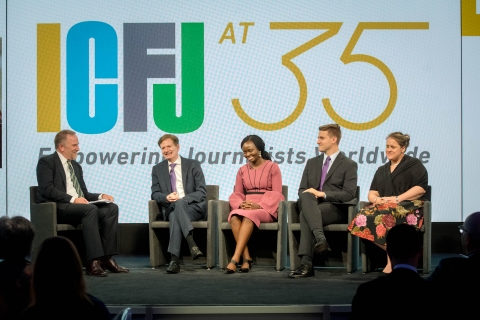
Claire Wardle, a leading expert on social media and how it is used to spread disinformation around the world, says Americans can better prepare themselves for the 2020 elections by learning from the experiences of other countries.
She said the U.S. public would not have been so surprised by the results of the 2016 presidential election if they had paid more attention to Brexit in England or to elections in other countries that chose nationalist leaders such as President Rodrigo Duterte in the Philippines.
Wardle, co-founder of First Draft, a New York-based nonprofit organization that researches misinformation and disinformation, spoke during a panel discussion organized by the International Center for Journalists (ICFJ). The panel was part of an event that highlighted ICFJ’s programs to promote journalism excellence and combat falsehoods on social media.
Other panelists included Glenn Kessler, a Washington Post editor and pioneer of the fact-checking movement; Hannah Ojo, an award-winning Nigerian journalist; and Matt Riley, a North Carolina journalist who focuses on using local TV and radio news to counter misinformation. Ojo and Riley are both ICFJ TruthBuzz Fellows working to find innovative ways to make truthful information spread virally.
At the event, hosted by Bloomberg News in New York, ICFJ also honored Kenyan reporter Dorcas Wangira, who received the Michael Elliott Award for Excellence in African Storytelling. This award is given by ICFJ in partnership with ONE and the family of Elliott, an outstanding editor and global philanthropist. Wangira said receiving the prize named for Elliott “gives me the challenge to make sure that just like him, I strive to bear witness to and improve the human condition through my work.”
ICFJ also announced that CBS News senior foreign correspondent Elizabeth Palmer will receive its 2019 Excellence in International Reporting Award. In addition, Univision Noticias’ Jose Zamora revealed that two intrepid international journalists, Stevan Dojčinović of Serbia and Rose Wangui of Kenya will receive ICFJ’s Knight International Journalism Award. Zamora’s father, a brave Guatemala publisher, won the award in 2003.

It was announced previously that Washington Post Executive Editor Martin “Marty” Baron will receive ICFJ’s Founders Award for Excellence in Journalism at the event.
During the panel discussion, Wardle said she expects the spread of disinformation to be different in 2020 than during the last U.S. presidential election. Back then, the disinformation came from automation and bots. “Now, we see Russians infiltrating American groups around politics, whether abortion or gun control,” she said. “And they then weaponize those groups to share the information. It’s all about sowing division.” She also said other countries, such as China, Iran and Saudi Arabia, are spreading misinformation in the United States.
Kessler, who is editor and chief writer of The Washington Post’s Fact Checker, said his experience at the Post has shown the effectiveness of fact checking, including its impact on President Trump’s credibility. “The president is rated very lowly on whether he tells the truth. And I think that is because we have constantly fact checked everything he said and shown why it was a threat.”
He said he and his team were stunned by the escalation of false claims by the U.S. president, from 450 after his first year in office to more than 10,000 now. “It’s been a bit of a burden for my staff because there are only three of us.”
As a TruthBuzz Fellow, Ojo creates short videos targeting young people and non-English speakers in an effort to make fact-checking go viral in Nigeria, Africa’s most populous country. She said messaging apps are widely used to spread disinformation about health issues, including fake cures for Ebola and false claims about the effects of immunization. Riley, the other TruthBuzz Fellow, works with local news stations and NPR affiliates in Raleigh, N.C. He said “local news is more trusted than anything else in the U.S. It also has some of the highest levels of engagement.”
For the past decade, ICFJ has supported groups worldwide that are spreading fact-checking across the globe. Its TruthBuzz Fellows are currently working in five of the world’s largest democracies, Brazil, India, Indonesia, Nigeria and the United States.
See photos from the event.